Please use this identifier to cite or link to this item:
http://hdl.handle.net/10311/168| Title: | Design and implementation of an online information literacy module: Experience of the Department of Library and Information Studies, University of Botswana |
| Authors: | Mutula, S. Kalusopa, T. Moahi, K. Wamukoya, J. |
| Keywords: | Information literacy Digital libraries Communication skills E-learning Botswana |
| Issue Date: | 2006 |
| Publisher: | Emerald Publishing Group td; www.emeraldinsight.com/oir.htm |
| Citation: | Mutula, S. et at (2006) Design and implementation of an online information literacy module: Experience of the Department of Library and Information Studies, University of Botswana, Online Information Review Vol.30, No.2, pp. 168-187 |
| Abstract: | Purpose - The purpose of this paper is to present findings of the design and implementation of an online information literacy module to first-year students at the University of Botswana. Design/methodology/approach - The study population consisted of 103 first-year students in the Department of Library and Information Studies. The population was divided into three equal groups of 34, 34 and 35, respectively, and each assigned a two-hour slot in the smart computer laboratory weekly for five consecutive weeks, to cover five information literacy topics online. Each group was assigned a tutor who received assignments online and graded them. Each topic was followed by questions for students to answer. Findings - Findings generally revealed that impartation of information literacy through the online mode could improve students' competencies perhaps more than the face-to-face instruction approach. Furthermore, respondents preferred a blended instruction approach to a single learning mode. Contrary to expectations, online instruction might not minimise the copying of each other's work among students to a great extent. Finally, online instruction does not necessarily reduce the amount of workload for staff and students, instead more time is needed to design and administer the course. Research limitations/implications - The study was limited to first year students in the LIS department. A similar study involving all departments in the University of Botswana would shed more light on the level of information literacy competency among first year students from a cross-disciplinary perspective. Practical implications - The major outcome of the study is a re-usable online information literacy module. The study findings could also be useful in developing interventions to improve the design and delivery of online courses. Originality/value - Information literacy is a key challenge facing educators all over the world. Case studies such as this provide unique and comparative experiences that advance existing knowledge. For the University of Botswana, the study provides a first insight into the impact of e-learning on information literacy competency since the implementation WebCT in 2002. |
| URI: | http://hdl.handle.net/10311/168 |
| ISSN: | 1468-4527 |
| Appears in Collections: | Research articles (Dept of Library and Information Studies) |
Files in This Item:
| File | Description | Size | Format | |
|---|---|---|---|---|
| mutulakalusopaetal2.pdf | 487.09 kB | Adobe PDF |  View/Open | |
| license.txt | 1.95 kB | Text | View/Open |
Items in DSpace are protected by copyright, with all rights reserved, unless otherwise indicated.
